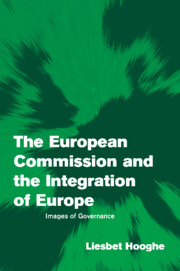Book contents
- Frontmatter
- Contents
- List of figures
- List of tables
- Preface
- Prologue
- 1 Preference formation in the European Commission
- 2 Men (and women) at Europe's helm
- 3 Images of Europe
- 4 Beyond supranational interest
- 5 Capitalism against capitalism
- 6 Principal or agent
- 7 Accommodating national diversity
- 8 Conclusion
- Appendix I Statistics
- Appendix II Description of independent variables
- Appendix III Survey material
- References
- Index
7 - Accommodating national diversity
Published online by Cambridge University Press: 22 September 2009
- Frontmatter
- Contents
- List of figures
- List of tables
- Preface
- Prologue
- 1 Preference formation in the European Commission
- 2 Men (and women) at Europe's helm
- 3 Images of Europe
- 4 Beyond supranational interest
- 5 Capitalism against capitalism
- 6 Principal or agent
- 7 Accommodating national diversity
- 8 Conclusion
- Appendix I Statistics
- Appendix II Description of independent variables
- Appendix III Survey material
- References
- Index
Summary
In search of eurofonctionnaires
A Commission without ready access (at least until 4 or 5 pm) to cappuccino, espresso, or lemon tea – and fresh croissants or Danish pastries – would be difficult to imagine. The cafeteria, often tucked away in a corner of the building, serves as an escape valve in an intense work environment, where officials unwind with political commentaries, playful flirtation, and culturally tinged pleasantries. French is still the dominant social language, though this is changing rapidly with English on the upswing. Yet old-timers claim that social gatherings have become increasingly mono-national: Spanish meet Spanish, Irish socialize with Irish, and so forth. The cafeteria is also a desirable location for informal work meetings. At any point during the day, one may observe a group of four to six officials sharing jokes or opinions with their chef d'unité (head of unit). Sometimes it is easier to vent frustration or air new ideas in the friendly and neutral setting of the cafeteria.
The occasional visitor may not pick up subtle differences between these two types of gatherings. A closer look reveals telling contrasts. Whereas social gatherings are usually genuinely egalitarian, work meetings are shaped by a fair dose of hierarchy. This is, after all, a public administration – and, in theory, one built on Weberian principles of organization. More remarkable still are the differences in the composition of these groups. The former gatherings are often nationally monocultural, but the latter always consist of different nationalities.
- Type
- Chapter
- Information
- The European Commission and the Integration of EuropeImages of Governance, pp. 168 - 192Publisher: Cambridge University PressPrint publication year: 2002



